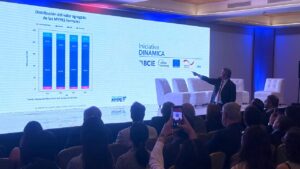
El Salvador’s economic future rests directly on its micro y pequeñas empresas (MYPES).This is the central conclusion of the third annual report, “The State of MSMEs 2025: The Other Side of the Economy,” presented by the MSME Observatory of the LID School of FUSAI and FLACSO.

The report’s most striking finding is the recalibration of this sector’s impact on the Gross Domestic Product (GDP). According to a new calculation that integrates both formal and informal units, MSMEs collectively contributed an average of 48.8% of GDP between 2020 and 2023. This percentage far exceeded the contribution of traditionally considered economic drivers.

Although formal MSMEs represent only 3.6% of the business population, they contributed a significant 8.2% of GDP, more than double their size, while informal MSMEs generated 40.6% of national production.

The study not only highlights the role of this sector but also classifies it as the main pillar of national production, confirming that MSMEs have surpassed large corporations and family remittances in economic importance.

Eight out of ten businesses turn to informal lenders
Despite its productive importance, the sector faces serious structural barriers that limit its potential and perpetuate a cycle of vulnerability. One of the most critical is the suffocating cost of informal credit. The study warns that usury is a severe obstacle, with an average annual interest rate reaching 1.869%. Eight out of ten businesses turn to informal lenders, attracted by their speed, which annually mobilizes $1,251.5 million in illegal loans, a figure equivalent to 3.6% of GDP.

MSMEs are confident in growth
Additionally, the report identifies the “gap due to excessive optimism or lack of concreteness”. MSMEs are confident in growth, but the saturation of businesses in limited markets and the loss of the population’s purchasing power frustrate these expectations. The result is that many companies survive by lowering prices, cutting staff, or cutting inventory, rather than investing in innovation.

MSMEs are confident in growth
Additionally, the report identifies the “over-optimism or under-concretization gap.” MSMEs are confident in growth, but business saturation in limited markets and the loss of purchasing power frustrate these expectations. The result is that many businesses survive by lowering prices, cutting staff or inventory, instead of investing in innovation.
Another factor impacting productivity is uneven digitalization. MSMEs use WhatsApp as their primary business tool, and six out of ten use Facebook; however, the most advanced tools are practically nonexistent. The adoption of digital payments is incipient, as two out of three entrepreneurs still operate in cash, which limits their financial traceability and access to formal markets.
Finally, the study reveals the invisible burden of care work, a gender factor that widens the gaps. More than six out of ten entrepreneurs spend an average of 4.1 hours a day on unpaid domestic tasks. This figure rises to five hours a day for women entrepreneurs (compared to 2.5 hours for men), which takes away vital time from managing and expanding their businesses.



You may also be interested in:







